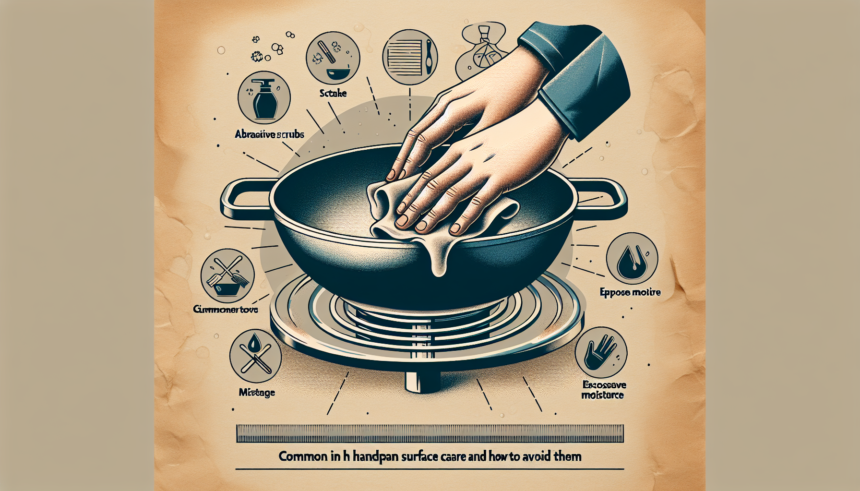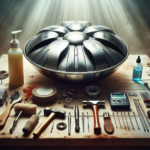<!DOCTYPE html>
<html lang="en">
<head>
<meta charset="UTF-8">
<meta name="viewport" content="width=device-width, initial-scale=1.0">
<title>Handpan Surface Care</title>
<style>
body {
font-family: Arial, sans-serif;
line-height: 1.6;
margin: 0;
padding: 0;
background-color: #f4f4f9;
color: #333;
}
.container {
width: 80%;
margin: 0 auto;
}
h2 {
color: #0056b3;
}
.content-section {
margin-bottom: 30px;
}
.faq-section {
background-color: #fff;
padding: 20px;
border-radius: 5px;
box-shadow: 0 0 10px rgba(0,0,0,0.1);
}
.faq-section h3 {
margin-top: 0;
}
.faq-item {
margin-bottom: 10px;
}
.faq-item p {
margin: 5px 0;
}
</style>
</head>
<body>
<div class="container">
<div class="content-section">
<h2>Understanding Handpan Surface Care</h2>
<p>
The handpan, with its ethereal tones and mesmerizing aesthetics, has captivated musicians and listeners globally. As a unique musical instrument, maintaining the handpan's surface is crucial for preserving its sound quality and longevity. However, many handpan enthusiasts, particularly beginners, make common mistakes when it comes to surface care. In this article, we will explore these pitfalls and provide tips on how to avoid them, ensuring your handpan remains in pristine condition for years to come.
</p>
</div>
<div class="content-section">
<h2>Avoiding Direct Exposure to Sunlight</h2>
<p>
One of the most prevalent mistakes is exposing the handpan to direct sunlight for extended periods. The intense heat can cause the metal to expand, potentially altering the tuning and diminishing the tonal richness. Furthermore, UV rays can damage the surface finish, leading to discoloration or fading.
</p>
<p>
<strong>Solution:</strong> Always store the handpan in a shaded, cool environment. If you are playing outdoors, ensure it remains in the shade and cover it with a soft cloth when not in use. This will minimize exposure to sunlight while keeping the instrument safe from environmental factors.
</p>
</div>
<div class="content-section">
<h2>Avoid Using Harsh Cleaners</h2>
<p>
Many believe that using household cleaners or abrasive materials can enhance the shine of their handpan. However, such substances can strip away protective coatings and scratch the surface, leading to corrosion and other forms of damage.
</p>
<p>
<strong>Solution:</strong> Use only products specifically designed for handpan maintenance. A soft microfiber cloth, slightly dampened with distilled water, is often sufficient for regular cleaning. For more thorough cleaning, a gentle, handpan-specific cleaner can be used according to the manufacturer's instructions.
</p>
</div>
<div class="content-section">
<h2>Handling the Handpan with Clean Hands</h2>
<p>
Oils, sweat, and dirt from unwashed hands can accumulate on the handpan, affecting its sound quality and promoting rust formation. Playing with dirty hands is a common mistake that can have significant negative effects over time.
</p>
<p>
<strong>Solution:</strong> Make it a habit to wash and dry your hands before each play session. This simple practice can greatly reduce the accumulation of grime and help in preserving the instrument's integrity. Additionally, consider using nitrile gloves if you are practicing for extended periods.
</p>
</div>
<div class="content-section">
<h2>Proper Storage of the Handpan</h2>
<p>
Improper storage is another frequent error, often overlooked until it's too late. Leaving the handpan exposed to fluctuating temperatures or excessive humidity can lead to deformation and rust.
</p>
<p>
<strong>Solution:</strong> Store your handpan in a hard case or bag designed to protect against moisture and impact. Ensure the storage environment is stable in temperature and humidity levels. Investing in a humidity-controlled room or a dehumidifier can be beneficial, especially in regions with high humidity.
</p>
</div>
<div class="content-section">
<h2>Be Gentle While Playing</h2>
<p>
Some players, in their enthusiasm, hit the handpan too hard. This can not only cause surface damage but also affect the tuning of the instrument.
</p>
<p>
<strong>Solution:</strong> Focus on technique and use gentle, controlled motions when playing. The handpan is designed to produce rich, resonant tones with minimal force. Consider enrolling in workshops or lessons to improve your playing technique.
</p>
</div>
<div class="content-section">
<h2>Conclusion</h2>
<p>
Caring for your handpan is essential to maintain its beauty and sound quality. By avoiding these common mistakes and following the suggested tips, you can ensure your handpan stays in top condition. Remember, the key to excellent surface care lies in regular, gentle maintenance and understanding the unique needs of this beautiful instrument. In doing so, you will prolong its lifespan, enhance its performance, and continue to create enchanting music for yourself and others to enjoy.
</p>
</div>
<div class="content-section faq-section">
<h3>Frequently Asked Questions (FAQs)</h3>
<div class="faq-item">
<h4>1. Can I use any type of oil for my handpan?</h4>
<p>
It’s best to use oils that are specifically designed for handpans. Avoid using kitchen oils, as these can become rancid over time and attract dust and grime.
</p>
</div>
<div class="faq-item">
<h4>2. How often should I clean my handpan?</h4>
<p>
Cleaning frequency depends on use and environmental conditions. As a general rule, consider giving it a gentle wipe down after every session and a thorough clean every few weeks or as needed.
</p>
</div>
<div class="faq-item">
<h4>3. What should I do if my handpan gets wet?</h4>
<p>
Immediately dry your handpan using a soft, absorbent towel. Avoid keeping it in a case until it’s completely dry to prevent rust formation.
</p>
</div>
<div class="faq-item">
<h4>4. Can I play my handpan in cold weather?</h4>
<p>
Yes, but be mindful of temperature changes. Allow your handpan to acclimate gradually to avoid tuning issues or damage. Playing in very cold conditions is generally not recommended.
</p>
</div>
<div class="faq-item">
<h4>5. Are there any signs of damage I should look out for?</h4>
<p>
Yes, keep an eye out for signs of rust, changes in sound, or any noticeable dents. Address these issues promptly to prevent further damage.
</p>
</div>
</div>
</div>
</body>
</html>Common Mistakes in Handpan Surface Care and How to Avoid Them

Leave a comment




